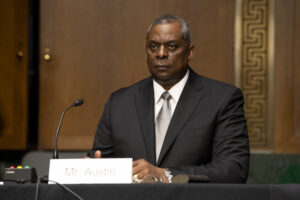Ret. Gen. Lloyd Austin, President Biden’s nominee for secretary of defense, committed Tuesday to extending his recusal from decisions involving Raytheon [RTN], where he has served on its board, for four years and pledged to not work for a defense firm after completing his government service.
Sen. Elizabeth Warren (D-Mass.) pressed Austin on his defense industry ties during his confirmation hearing, including having the nominee agree to several ethics considerations above what is required by law.

“I believe we have to do a lot more to end the cozy relationship between the Pentagon and the defense industry. Over the years, I’ve proposed a number of legal changes in this area,” Warren said. “I am very pleased to hear that you’ve pledged that you will extend your recusal from matters involving Raytheon for four years and that you’re not going to seek a waiver from those recusals.”
Austin had previously pledged to recuse himself from decisions involving Raytheon for at least a year, the statute required by law (Defense Daily, Jan. 11).
“Senator, I can make the commitment to you that I will extend my recusal for Raytheon and I certainly appreciated the opportunity to discuss these issues with you,” Austin said. “As you are aware, what you’ve asked for is beyond what’s required by law and I’m making this commitment because I recognize the unique circumstances here that you’ve highlighted. Raytheon is one of the world’s largest defense contractors and I’m sensitive to the appearance and concerns that you raised in this particular situation.”
Following his retirement from the military, Austin joined the board of United Technologies Corp. in September 2016 and then became a director on Raytheon’s board when the companies merged in April 2020.
Austin also stands to receive up to $1.7 million in payments from Raytheon as he divests his shares in the company in preparation for his new position, according to documents filed with the Office of Government Ethics.
Warren noted she has pushed for legislation to bar defense contractors from hiring former senior government officials, and said Austin’s reassurance that he will not do so after leaving the Pentagon “helps improve public trust in our leaders.”
“I do not intend to seek employment as a lobbyist or sit on a board of a defense contractor, like Raytheon, after my service. Quite frankly, I’ll be too old to sit on a board of a defense contractor after my service,” Austin said.
Austin also said he will consider all available options before seeking a waiver if he was required to weigh in on a decision that related to Raytheon, to ensure the public has “no reason to question [his] impartiality.”
“With respect to seeking a waiver, I do not expect to do that or to need one. But if such an unanticipated circumstance were to arise, I would consider available alternatives to a waiver before seeking one and would consult very carefully with agency ethics officials,” Austin said.
Mark Esper, the previous defense secretary and a former Raytheon executive himself, had faced similar scrutiny from Warren but did not ultimately agree to extending the recusal period or pledging to not take a job with a defense firm after leaving the Pentagon.